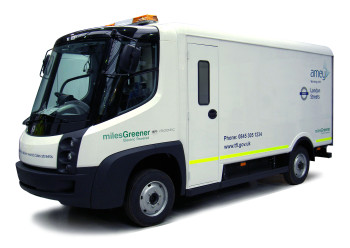
The benefits of all-electric vehicles for urban distribution work are widely acknowledged – zero emissions, low tax, no congestion charge and no requirement (if over 3.5 tonnes) for a tachograph.
There is also a growing body of evidence that whole-life costs for electric vehicles can be lower than those for diesel-engined vehicles used on low mileage work, and that is certainly what office supply company Lyreco seem to be expecting from the Modec electic van they have been trialling.
Although electric vehicles continue to be restricted by their limited ranges – up to 100 miles in the case of the Modec – a surprising number of delivery vehicles don’t do more than 50-100 miles a day. These are typically used in the urban and stop-start environments where the benefits of electric power are greatest. Lyreco, for example, say that 30% of their vehicles do fewer than 60 miles a day and 65% do fewer than 100 miles a day.
The Modec’s maximum speed of 50mph is more than adequate for London deliveries, and its 2 tonne payload makes it a suitable replacement for the Mercedes Sprinter 511 vans Lyreco normally uses. Added bonuses are zero road tax, zero congestion charge and an 8-hour charge cycle – which can easily be fitted in overnight. I wonder if they can benefit from cheap electricity rates during off-peak hours?
Hybrids vs. All-Electric Vehicles
Hybrid’s seem to be the flavour of the month at present and I do think they have a role to play in the future. Pure electric vehicles, however, can potentially solve a greater number of problems and also offer the twin benefits of much greater simplicity and zero emissions at point of use. Although power stations undoubtedly have their own pollution problems, they aren’t in city centres and are relatively few in number – hopefully making it easier for their emissions to be managed and contained as emission reduction technology develops.
Improvements in battery technology and cost seem to be the key to the success of electric vehicles. If range issues can be addressed and battery costs reduced, a major obstacle should be removed. Perhaps a more likely near-future scenario is that of the Chevrolet Volt – an all-electric car with a small on-board petrol engine to charge the batteries (not power the vehicle) whenever needed.
